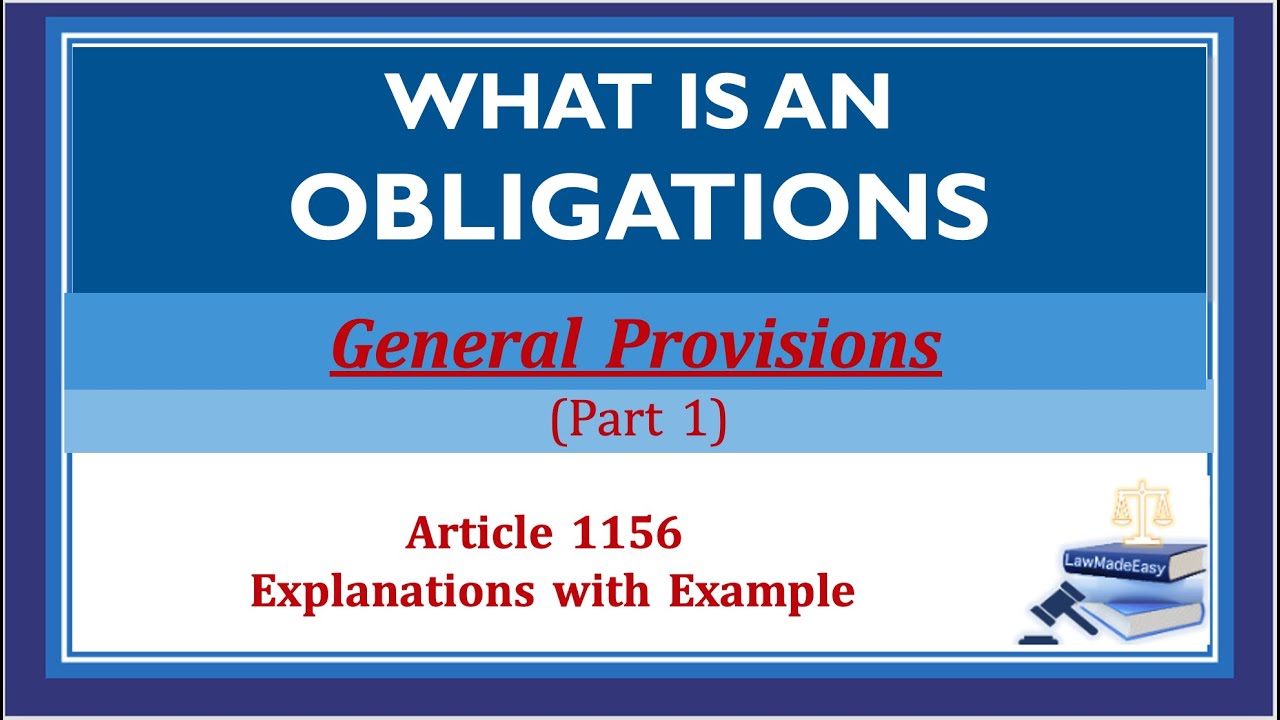Obligations with a Period
Summary
TLDRThis video discusses the second type of obligation under the Civil Code of the Philippines: obligations with a period. It explains that such obligations are based on a future and certain event, meaning the obligation becomes demandable or ends when a specific time arrives. The video also contrasts obligations with a period against conditional obligations, outlines different types of periods (e.g., legal, voluntary, judicial), and provides examples to clarify concepts. Lastly, it highlights when courts can intervene to set periods for obligations without specific timelines.
Takeaways
- 📜 The video discusses 'Obligations with a Period' under the Civil Code of the Philippines.
- ⏳ An obligation with a period is one where demandability or extinguishment depends on the expiration of a set term.
- 📅 A period is defined by a future and certain event, like a specific date (e.g., December 31, 2021).
- 🔄 The key difference between a period and a condition is that a condition may or may not happen, while a period is certain to occur.
- ⚖️ Article 1193 of the Civil Code of the Philippines outlines the specifics of obligations with a period, including examples involving death and fixed dates.
- 🔄 Two main types of periods are 'ex die' (with suspensive effect) and 'in diem' (with resolutory effect).
- 🛠️ The court can fix a period if no time is specified, or if the duration depends on the debtor's will (per Article 1197 of the Civil Code).
- 📅 Periods can also be classified as legal (set by law), voluntary (agreed upon by parties), or judicial (set by the court).
- 💸 An obligation to pay a debt when one's means permit is considered an obligation with a period, not a condition.
- ⚖️ Once a court sets a period for an obligation, it becomes part of the agreement and cannot be altered.
Q & A
What is an obligation with a period under the Civil Code of the Philippines?
-An obligation with a period is an obligation whose demandability or extinguishment is subjected to the expiration of a specific term, which is certain to occur. It relates to a future and certain event.
Can you give an example of an obligation with a period?
-An example of an obligation with a period is when D is obliged to give his laptop to C on December 31, 2021. This is an obligation with a period because there is a definite date when the obligation must be fulfilled.
What is a 'day certain' in the context of obligations with a period?
-A 'day certain' is a future date that is certain to come, although it may not be known exactly when. For example, the death of a person is a day certain because it is inevitable but the exact date is unknown.
How does a condition differ from a period?
-A condition is an event that may or may not happen, making it uncertain. A period, on the other hand, is an event that will definitely occur, either at a known date or an unknown time in the future.
What happens when a period depends on the will of the debtor?
-If a period depends on the will of the debtor, such as 'when my means permit me to do so,' the creditor can ask the court to fix the duration of the period, as stated in Articles 1180 and 1197 of the Civil Code of the Philippines.
What are the types of periods according to their effect?
-There are two types of periods based on their effect: (1) Ex die, a suspensive period where the obligation becomes demandable after the period lapses, and (2) In diem, a resolutory period where the obligation is demandable immediately but is extinguished upon the expiration of the period.
What are the different sources of periods?
-Periods can come from three sources: (1) Legal period, set by law; (2) Voluntary period, set by agreement of the parties; and (3) Judicial period, set by a court.
What is an ex die period?
-An ex die period is a suspensive period, meaning the obligation becomes demandable only after a certain date is reached. For instance, if X promises to give Y 5,000 pesos on December 1, 2021, the obligation becomes demandable only on that date.
What is an in diem period?
-An in diem period is a resolutory period, where the obligation is demandable immediately but is extinguished after a certain date. For example, if X promises to give Y 100 pesos per day until December 1, 2021, the obligation ends on that date.
When can a court fix the duration of a period?
-A court can fix the period when (1) the contract does not specify a period but one is inferred from the nature of the obligation, or (2) the period depends on the will of the debtor, such as 'when my means permit me to do so.'
Outlines

هذا القسم متوفر فقط للمشتركين. يرجى الترقية للوصول إلى هذه الميزة.
قم بالترقية الآنMindmap

هذا القسم متوفر فقط للمشتركين. يرجى الترقية للوصول إلى هذه الميزة.
قم بالترقية الآنKeywords

هذا القسم متوفر فقط للمشتركين. يرجى الترقية للوصول إلى هذه الميزة.
قم بالترقية الآنHighlights

هذا القسم متوفر فقط للمشتركين. يرجى الترقية للوصول إلى هذه الميزة.
قم بالترقية الآنTranscripts

هذا القسم متوفر فقط للمشتركين. يرجى الترقية للوصول إلى هذه الميزة.
قم بالترقية الآنتصفح المزيد من مقاطع الفيديو ذات الصلة

Dwi Aryanti Ramadhani, S.H., M.H. - HUKUM PERIKATAN (JENIS-JENIS PERIKATAN)

Pure and Conditional Obligations

UPDATED DISCUSSION: What is an Obligation? Obligations and Contracts General Provision. Part 1.

General Provisions - Obligations (Part 1)

Law on Obligations- Chapter 1

When are you considered in delay? When are you liable for damages? (Articles 116-1170, Civil Code)
5.0 / 5 (0 votes)
